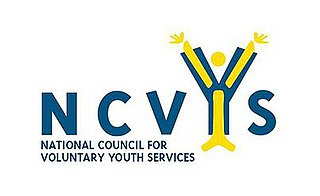
Estyn is the education and training inspectorate for Wales. Its name comes from the Welsh language verb estyn meaning "to reach (out), stretch or extend". Its function is to provide an independent inspection and advice service on quality and standards in education and training provided in Wales.

Citizens Advice is an independent organisation specialising in confidential information and advice to assist people with legal, debt, consumer, housing and other problems in the United Kingdom.
The National Deaf Children's Society (NDCS) is a British charity dedicated to providing support, information and advice for deaf children and young people, their families and professionals working with them.
Personal, social, health and economic education (PSHE) is a primary and secondry school curriculum subject in England that teaches young people, through all key stages, knowledge and skills for life during and after education. PSHE consists of education on personal and health related matters, such as Relationship and Sex Education, as well as preparation for post-education life, such as economic sustainability and careers advice.
In England, a Connexions Centre was a location, as part of the government-funded Connexions service, where young people aged thirteen to nineteen in England could go for confidential support and advice on a number of topics. The staff were known as Connexions Personal Advisers and were "trained to offer confidential advice and practical help".

The Convention of Scottish Local Authorities (COSLA) is the national association of Scottish councils and acts as an employers' association for its 32 member authorities.
Spurgeons is a large national children's charity in the United Kingdom, working with vulnerable families, children and young people. It is based in Rushden, with several offices in the UK, and is a registered charity.
Overview and Scrutiny is a function of local authorities in England and Wales. It was introduced by the Local Government Act 2000 which created separate Executive and Overview and Scrutiny functions within councils.

The City of Liverpool College is a further education and higher education college in Liverpool, England.

In England, local authorities have duties to homeless people under Part VII of the Housing Act 1996 as amended by the Homelessness Act 2002. There are five hurdles which a homeless person must overcome in order to qualify as statutory homeless. If an applicant only meets the first three of these tests Councils still have a duty to provide interim accommodation. However an applicant must satisfy all five for a Council to have to give an applicant "reasonable preference" on the social housing register. Even if a person passes these five tests councils have the ability to use the private rented sector to end their duty to a homeless person.

The Learning and Skills Act 2000 is an Act of the Parliament of the United Kingdom, introduced under the first Tony Blair government. It made changes in the funding and administration of further education, and of work-based learning for young people, within England and Wales.

Community Education, also known as Community-Based Education or Community Learning & Development, or Development Education is an organization's programs to promote learning and social development work with individuals and groups in their communities using a range of formal and informal methods. A common defining feature is that programmes and activities are developed in dialogue with communities and participants. The purpose of community learning and development is to develop the capacity of individuals and groups of all ages through their actions, the capacity of communities, to improve their quality of life. Central to this is their ability to participate in democratic processes.
A community legal centre (CLC) is the Australian term for an independent not-for-profit organisation providing legal aid services, that is, provision of assistance to people who are unable to afford legal representation and access to the court system. They provide legal advice and traditional casework for free, primarily funded by federal, state and local government. Working with clients who are mostly the most disadvantaged and vulnerable people in Australian society, they also work with other agencies to address related problems, including financial, social and health issues. Their functions may include campaigning for law reform and developing community education programs.
Education Business Partnerships (EBPs) were, until 2011, UK-government-sponsored bodies. In 2011, the Department for Education (DfE) abolished funding for Education Business Links. EBPs now directly contract with schools to provide Work Experience, Work Related Learning, Enterprise Education and Careers Education, and Information and Guidance (CEIAG) by linking the worlds of business and education to offer young people a rewarding and realistic introduction to work. Around two-thirds of secondary schools nationally have decided to maintain a work experience offer.
Careers advisory services in the UK are typically organisations that offer advice, guidance and counselling on careers. People may use these services for a number of purposes, such as jobhunting, changing careers, getting a promotion, building career skills, returning to work after a career break and professional development. Career challenges such as these occur for many reasons, including redundancy, motherhood, leaving full-time education, relocation, or simply coming to the end of a work contract.
Kent Association for the Blind is a registered charity providing rehabilitation services for children and adults with visual impairment to support them and help them live independent lives. Services are provided by six, specialist rehabilitation teams based in offices in Kent, Medway and Bromley. Additional specialist support is provided in Bexley.

The National Council for Voluntary Youth Services (NCVYS) was a membership network of over 200 voluntary and community organisations, as well as local and regional networks, that work with and for young people across England. The organisation closed in 2016. For 80 years, NCVYS acted as an independent voice of the voluntary and community youth sector, working to inform and influence public policy, supporting members to improve the quality of their work, and also raising the profile of the voluntary and community sector's work with young people.
The National Careers Service is the publicly funded careers service for adults and young people in England.

The Scottish Council of Independent Schools (SCIS) is a registered Scottish charity which represents the independent school sector in Scotland. Its membership includes mainstream fee-paying independent schools and a range of schools for young people with complex additional support needs.
The Career Development Institute is the British professional association for career development.









